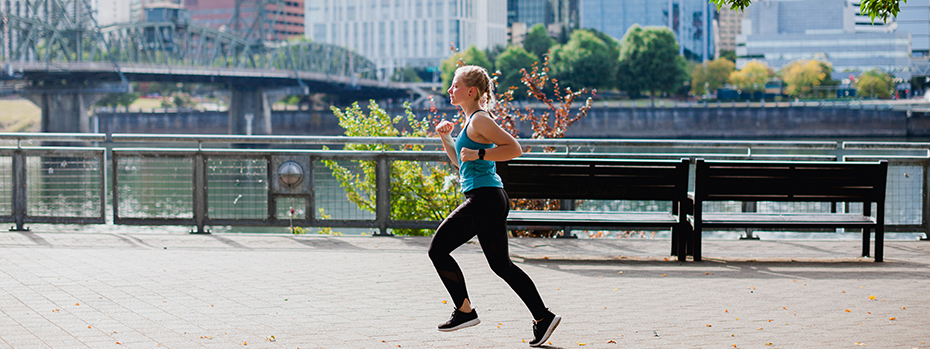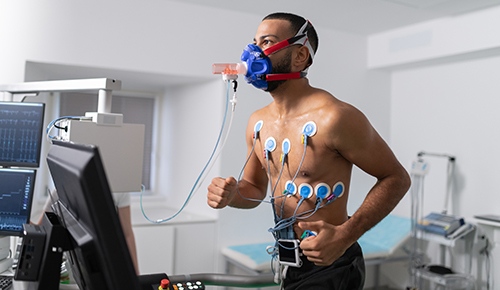Sports Cardiology

Physical activity helps keep your heart healthy. It also makes your heart work harder. OHSU's sports cardiology program helps athletes of all skill levels exercise safely.
If you are physically active, or plan to be, we can support your heart health. Our team can:
- Identify congenital heart conditions or cardiovascular disease.
- Evaluate your heart to make sure you're able to participate in sports.
- Help treat your symptoms during exercise.
- Help you become active again after a heart attack or other heart condition.
- Help you improve your athletic performance.
- Connect you to the right specialists based on your needs.
We are part of the OHSU Knight Cardiovascular Institute, Oregon's only comprehensive heart program, with services ranging from prevention to transplants.
What is sports cardiology?
Sports cardiologists are experts in heart care for athletes and people who are physically active. If you have a heart condition, a sports cardiologist can help you exercise safely. If you have heart-related symptoms when you exercise, they can find the cause.
A sports cardiologist can help you understand the benefits and risks of exercising based on your heart health and preferred exercise.
Who should see a sports cardiologist?
We work with a wide range of athletes ages 16 and up:
- Members of high school, college, professional and masters sports teams
- Active people who have a cardiac condition, have symptoms during exercise or are at high risk for heart disease
- People whose work requires demanding physical activity, such as firefighters, police officers and military personnel
Call 911 or contact your primary care provider if you have any of these symptoms when you're exercising:
- Chest discomfort
- Unexpected shortness of breath
- Lightheadedness or dizziness
- Passing out
- Hard-to-explain declines in your athletic performance
If you have symptoms like these when you exercise, we can help. Ask your primary care provider for a referral.
Complete care
Dr. Bradley Petek leads the program. He has advanced training in sports cardiology and experience caring for casual and professional athletes.
The program also includes:
- Dr. Francis Phan, an expert in sports electrophysiology, or abnormal heart rhythms
- Dr. Lidija McGrath, an expert in sports congenital heart disease, for athletes born with heart conditions
We provide sports cardiology care for many teams and organizations, including the National Hockey League (NHL) scouting combine, Oregon State University, University of Portland, Portland State University, University of Oregon, Portland Winterhawks, Portland Fire & Rescue and the Portland Police Bureau.
Conditions we treat
We work with athletes to identify and treat many heart conditions and concerns. Find answers to frequently asked questions about cardiology conditions and treatments.
Arrhythmia means an abnormal heartbeat. There are many different types of arrhythmias including:
- Atrial fibrillation
- Supraventricular tachycardia
- Wolff-Parkinson-White syndrome
- Long QT syndrome
- Ventricular tachycardia
- Brugada syndrome
- Premature atrial contractions (PACs)
- Premature ventricular contractions (PVCs)
- Atrioventricular block (heart block)
- Sick sinus syndrome
High blood pressure, high cholesterol levels, high blood sugar, obesity and a family history of cardiovascular disease can all increase your risk for a health problem. We'll discuss with you how these and other risk factors may affect exercise.
Cardiomyopathy is a disease that makes it harder for the heart to pump blood through your body. It can also lead to abnormal heart rhythms. Regular physical activity can cause an athlete's heart to grow. This can look like certain types of cardiomyopathy. Our medical team will identify your condition and advise you on the safety of exercise.
The aorta is the biggest artery carrying blood from the heart to the rest of the body. If your aorta has become abnormally large or you have a genetic aortic disease, tears in this blood vessel may occur. OHSU's cardiology team includes specialists in aortic disease who can treat your aortopathy and give you recommendations for exercise.
We can help you manage your risk for a heart attack when you're exercising. If you have already had a heart attack, we can help you become physically active again.
Cardiac arrest is when the heart stops beating. We examine survivors of sudden cardiac arrest to find the underlying cause. We help athletes who have had a sudden cardiac arrest event try to understand the cause and advise them on the safety of returning to exercise.
Sports cardiology services
When you make an appointment with us, you may see several members of our team and take several different tests. We use the most advanced equipment available to examine your heart and lungs.
What to expect
You'll meet with a sports cardiologist. One of the doctors on our team will talk to you about your medical history, symptoms and exercise habits. They will also do a physical exam.
You'll take a cardiopulmonary exercise test. This test is a type of cardiac stress test. Wearing sensors that monitor your lungs and heart, you'll run on a treadmill or pedal on a bike while we gradually make your workout more intense. This will help us see how your body responds to exercise. It will also help us diagnose the cause of symptoms you may have with exercise.

We'll put together a team of specialists. Our sports cardiologist will bring together doctors and nurses from general cardiology, sports medicine, pulmonary medicine and other departments to care for you. Together, we will find the best ways to treat you and help you make the most of your favorite activities.
Screening and prevention
We use the latest technology to evaluate your heart:
- 12-lead electrocardiogram (EKG or ECG): We will put sensors on your arms, chest and legs to measure your heart's electrical activity.
- Portable cardiac rhythm monitor: You may wear a small, wireless device for several days to track your heart activity.
- Echocardiography: An echocardiogram uses ultrasound waves to create a picture of your heart and study your blood flow.
- MRI of the heart: We use magnet and radio waves to measure your function and look at your heart.
- Cardiac CT scan: This test uses X-rays to create high-definition images of your heart and surrounding structures.
- Other laboratory tests: We may draw a blood sample to measure your electrolyte levels, kidney function, cholesterol levels, thyroid function and iron levels.
Our team
-
- Lidija McGrath, M.D.
- Accepting new patients
-
- Bradley Petek, M.D. (he/him)
- Accepting new patients
Locations
Center for Health & Healing, Building 1
3303 S. Bond Avenue
Portland, Oregon 97239
Free parking for patients and visitors
Refer a patient
- Refer your patient to OHSU.
- Call 503-494-4567 to seek provider-to-provider advice.